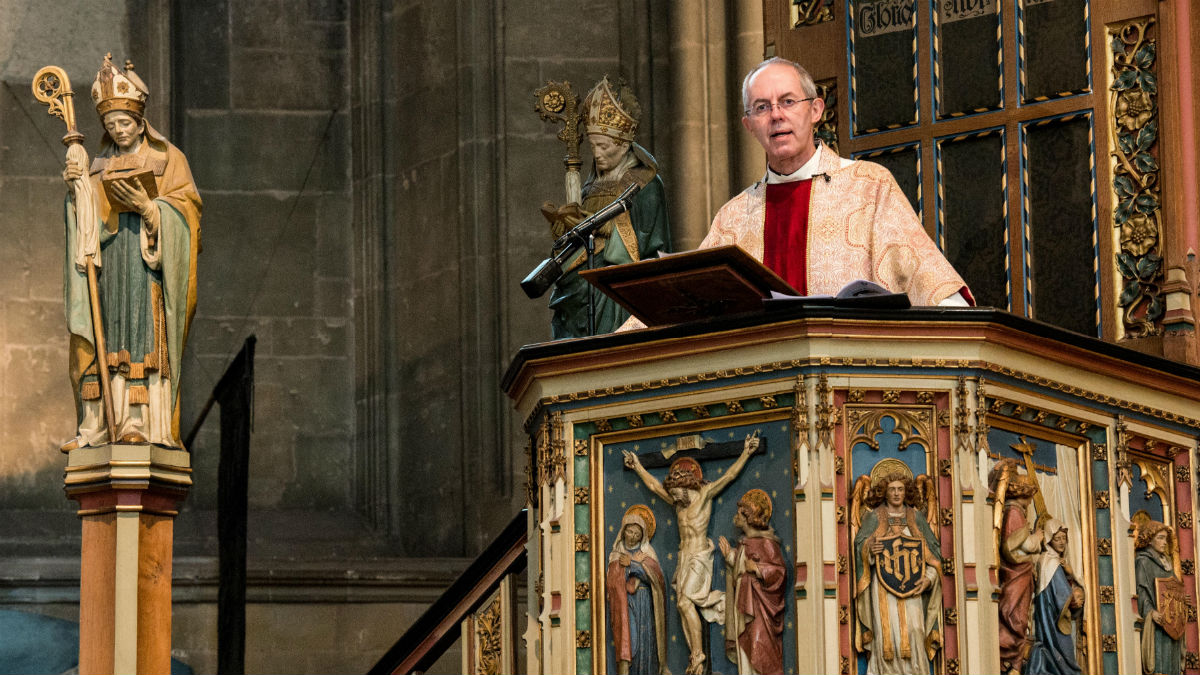Anglican church avoids split over gay rights
Liberals left counting cost of unity as summit affirms marriage as being 'between a man and a woman'

A free daily email with the biggest news stories of the day – and the best features from TheWeek.com
You are now subscribed
Your newsletter sign-up was successful
The Anglican church has narrowly avoided disintegrating over the issue of gay rights, but liberal adherents will be "dismayed" by the compromise involved in staying together, says The Guardian.
At a critical global summit in Canterbury, church leaders issued a statement in support of the "traditional doctrine" that marriage should be between a man and a woman.
The week-long meeting has its roots in a crisis dating back to 2003, when the liberal US branch the Episcopal church ordained its first openly gay bishop, Gene Robinson, along with recent developments such as same-sex marriage.
The Week
Escape your echo chamber. Get the facts behind the news, plus analysis from multiple perspectives.

Sign up for The Week's Free Newsletters
From our morning news briefing to a weekly Good News Newsletter, get the best of The Week delivered directly to your inbox.
From our morning news briefing to a weekly Good News Newsletter, get the best of The Week delivered directly to your inbox.
What has been happening in Canterbury?
The city's cathedral has been playing host to 39 primates - chief archbishops or bishops of the Anglican church - from all over the world this week in a meeting organised by the Archbishop of Canterbury, Justin Welby. The summit continues today.
Could the church really have split?
It was widely predicted the church would experience a "schism" over gay rights, with primates opposed to gay marriage or gay clergy leading their churches as part of the global Anglican communion.
A free daily email with the biggest news stories of the day – and the best features from TheWeek.com
What was the Archbishop's plan?
Archbishop Welby hoped to put an end to the disputes and shift the church's focus to issues such as religious violence and climate change. He proposed the communion become a loose federation of churches, with differing views on some doctrine.
Who opposes gay rights in the church?
The strongest opposition comes from African countries, especially Kenya, Uganda and Nigeria, where the churches support the recriminalisation of homosexual relations. The US and Canadian branches are the strongest proponents of equality.
Was there a schism in the end?
Only the Archbishop of Uganda, Stanley Ntagali, walked out of the meeting, says the BBC. He had failed to gather support for his motion demanding the US and Canadian branches leave the communion.
What compromise was reached?
The global church held together - but at a cost to liberals. The primates agreed to impose sanctions on the US Episcopal church for accepting gay marriage and signed a joint declaration that marriage is "between a man and a woman".
Will the agreement make anybody happy?
The Episcopal church's Presiding Bishop Michael B Curry said the declaration would "bring real pain" to gays and lesbians. Conservative primates, meanwhile, said in a statement that they were pleased with the result but it must "not be seen as an end, but as a beginning".
Has the row weakened the Anglican communion?
In an opinion piece for The Guardian ahead of the meeting, religious affairs writer Andrew Brown said the church has "never really existed as a coherent body" in any case, but feared the row would show the world that the church is more interested in sex than tackling war and need.
Brown wrote: "Apparently [the primates believe] that genocide is more biblical than sodomy."
-
 Will increasing tensions with Iran boil over into war?
Will increasing tensions with Iran boil over into war?Today’s Big Question President Donald Trump has recently been threatening the country
-
 Corruption: The spy sheikh and the president
Corruption: The spy sheikh and the presidentFeature Trump is at the center of another scandal
-
 Putin’s shadow war
Putin’s shadow warFeature The Kremlin is waging a campaign of sabotage and subversion against Ukraine’s allies in the West
-
 Epstein files topple law CEO, roil UK government
Epstein files topple law CEO, roil UK governmentSpeed Read Peter Mandelson, Britain’s former ambassador to the US, is caught up in the scandal
-
 Iran and US prepare to meet after skirmishes
Iran and US prepare to meet after skirmishesSpeed Read The incident comes amid heightened tensions in the Middle East
-
 Israel retrieves final hostage’s body from Gaza
Israel retrieves final hostage’s body from GazaSpeed Read The 24-year-old police officer was killed during the initial Hamas attack
-
 China’s Xi targets top general in growing purge
China’s Xi targets top general in growing purgeSpeed Read Zhang Youxia is being investigated over ‘grave violations’ of the law
-
 Panama and Canada are negotiating over a crucial copper mine
Panama and Canada are negotiating over a crucial copper mineIn the Spotlight Panama is set to make a final decision on the mine this summer
-
 Why Greenland’s natural resources are nearly impossible to mine
Why Greenland’s natural resources are nearly impossible to mineThe Explainer The country’s natural landscape makes the task extremely difficult
-
 Iran cuts internet as protests escalate
Iran cuts internet as protests escalateSpeed Reada Government buildings across the country have been set on fire
-
 US nabs ‘shadow’ tanker claimed by Russia
US nabs ‘shadow’ tanker claimed by RussiaSpeed Read The ship was one of two vessels seized by the US military